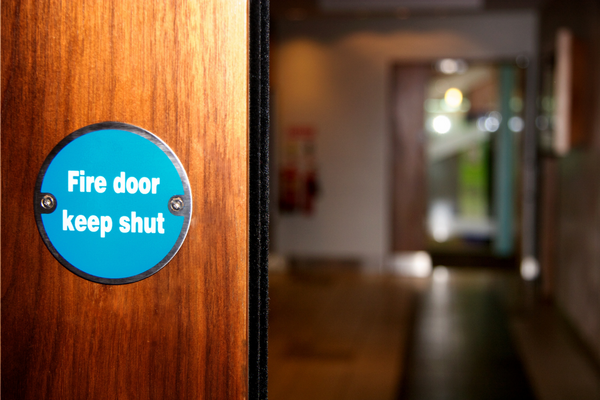Multi-let dwellings are at a higher risk of fire – here’s how to reduce it

Any dwelling that houses multiple unrelated contract-holders is at a higher risk of fire breaking out than a dwelling rented by a single household. That’s mainly because room doors are more likely to be locked, which means contract-holders may not have a clear escape route. Also, when each contract-holder is living independently, you’ll usually have multiple electrical items switched on in every room, each of which could potentially be a fire hazard – especially when you as the landlord have no control over the quality or standard of these items.
As a result, the fire safety rules are much tighter for HMOs than for single lets. The exact rules will vary, depending on whether the HMO has to be licensed - either because it’s a ‘large HMO’ (5 or more occupants forming more than one household) or your Local Authority requires smaller HMOs (3 or more occupants) to be licensed - and your Local Authority may have their own fire safety requirements, over and above the national laws.

What are the key fire safety regulations?
For single-let properties:
- You have to assess the potential fire risks
- Furniture and upholstery must meet fire safe standards
- contract-holders must have clear access to escape routes
- A smoke alarm must be installed on each floor
For additional information on fire safety in single lets in England and Wales, see here.
Additional regulations for HMOs usually include:
- The fire risk assessment must be in writing
- Fire doors must be fitted on every escape route
- Smoke alarms must be installed in each individual ‘unit’, e.g. bedroom
- There must be a heat sensor alarm and a fire blanket in the kitchen
- The fire alarm system must be interconnected and mains-powered - with a central control panel if the HMO is licensed
- There must be a multi-purpose fire extinguisher on each floor
How do I find out what fire safety measures are required for my own HMO?
You need to take some expert advice. If you’re letting though an agent, they should be able to advise you, but if you’re letting and managing the dwelling yourself, then there are two places to go.
First, speak to the housing department at your local council. They’ll be able to tell you what fire safety licensing conditions need to be met. Secondly, it’s advisable to have a Fire Safety Officer visit the dwelling in person and advise you of both the legal requirements and best practice. They can also carry out a professional risk assessment for you. You should be able to find a local company online, or contact your local fire department and they can point you in the right direction.

Do I need to make any ongoing fire safety checks?
Making sure your dwelling meets fire safety standards before it’s rented out is one thing. However, once contract-holders are living there, you’ve got to take reasonable steps to make sure they aren’t doing anything to put themselves in danger, e.g. propping open fire doors and blocking escape routes with bikes or other belongings.
The benefit of being an HMO landlord is that, unlike in a single let, you have the right to enter communal areas, so making periodic checks shouldn’t be an issue for you – or for your agent. Here are some of the key things to check, ideally every 4-6 months:
- Are the escape routes clear?
- Is the fire alarm system working? Test the alarms and keep a written record of the check.
- Are all the fire doors closed as they should be? (Except for rooms where you may have fitted a device that holds the door open until the fire alarm is triggered – often used for the communal room and kitchen).
- Are the fire extinguishers where they should be? These must be serviced annually.
And then the written risk assessment should be reviewed every couple of years.
Overall, the two most important things to consider are: have you complied with your legal obligations and are you satisfied that if anything went wrong, you could prove that you’d taken all reasonable steps to keep your contract-holders safe?
Protect yourself financially with landlord insurance
No matter how careful you are about fire safety, accidents and ‘Acts of God’ do occasionally happen, so it’s important to protect your investment with appropriate landlord insurance. And bear in mind that, because HMOs are considered high risk, you will need a specialist HMO product, which not every insurance provider offers.
To discuss getting the right cover for your HMO, call our partner Bode Insurance Solutions on 01903 890044 or you can get a quote online in just a few minutes.
We are an introducer appointed representative of Bode Insurance Solutions (company no 03101637) Registered Address: Crowthorne House, Nine Mile Ride, Wokingham, Berkshire, RG40 3GZ. Bode Insurance Solutions Limited are authorised and regulated by the Financial Conduct Authority (FCA) under firm reference 313541. You may check this on the Financial Services Register by visiting the FCA’s website https://register.fca.org.uk/s/ or by contacting the FCA on 0800 111 6768.
Looking for advice?
If you're looking to let or sell your property, we can help. Get in touch with your local branch or book in for a property valuation.

Contact Us
Got a question, general enquiry or something else?
You may also like
Since we started in 2001 we have grown to three branches across Cardiff, we can save you time and money by offering a range of services and expertise under one roof.



